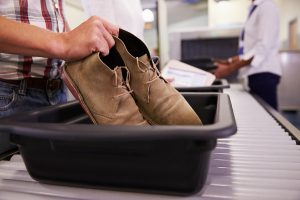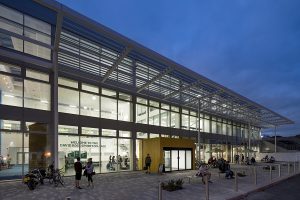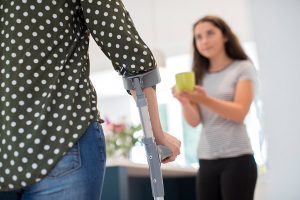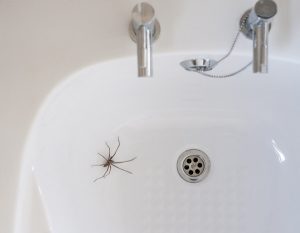
October 18, 2018, by Liz Goodwin
University News Review — September 2018
September saw many University of Nottingham news stories in the headlines…
The dirtiest area of the airport
The story that airport security trays carry more viruses than toilet surfaces, hit the national headlines this month.
According to pandemic scientists at the University of Nottingham and the Finnish National Institute for Health and Welfare, the plastic security trays — circulated along the passenger queue at the hand luggage X-ray checkpoint — harbour the highest levels of viruses at airports.
The Guardian, Independent, Daily Mail, Telegraph and Sky News, all featured the health story, which concluded that simple precautions, like hand washing and coughing into a handkerchief, can minimise contagion. The most common virus found in the survey was rhinovirus, which causes the common cold but the swabs, taken at Helsinki-Vantaa airport, also picked up the influenza A virus. Interestingly, no respiratory viruses were found on toilet surfaces.
Professor of Health Protection, Jonathan Van Tam, said: “This study supports the case for improved public awareness of how viral infections spread.”
Sports and International University of the Year 2019
The University was thrilled to discover it was crowned as best in the UK for sports, and is the most international university, according to The Times and The Sunday Times Good University Guide 2019.
It’s the first time in the history of the Guide that a university has been given two awards and enough to earn a shortlisting, for the second year running, for the coveted University of the Year Award.
The University draws students from 150 countries to its UK campuses in and around Nottingham, while campuses in China and Malaysia cement Nottingham’s global standing. And sport helps bring the whole enterprise together via an annual week-long festival of sport. The Tri Campus Games brings over 200 students together from across the three locations, with a different campus hosting the event each year.
Talking about the £40m David Ross Sports Village which opened in 2016, Dan Tilley, Director of Sport, said: “I think the facilities make a big difference. The Centre has transformed our offer. It is very tangible and a demonstrable indicator of how seriously we take our sport that has naturally drawn people to us.”
Worms in space hold key to astronauts’ muscle loss
Thousands of worms will be launched into space later this year to help scientists find out why astronauts experience significant muscle loss in zero-gravity during spaceflight.
The Worms in Space project is the first UK experiment to take place on the International Space Station and involves teams of scientists from the Universities of Nottingham, Exeter and Lancaster, looking for new treatments for muscular dystrophies and diabetes.
Liaising with the BBSRC, Emma Rayner, Media Relations Manager for the Faculty of Medicine and Health Sciences, with colleagues from the Universities of Exeter and Lancaster Press Offices, ensured BBC Breakfast News was given special access to the scientists as they prepare to launch the worms into space. Breakfast’s John McGuire went to Switzerland to see them at the laboratory, which specialises in space biology, on the shore of Lake Lucerne.
The University of Nottingham’s Professor of Space Biology, Nate Szewczyk, said: “We are hugely excited to be spearheading this unique world-first experiment on the Space Station this winter. The Molecular Muscle Experiment is the first to try to establish the precise molecular causes of neuromuscular decline in space.
“Our colleagues on the ISS will be helping us to use combinations of gene manipulations and drugs to pinpoint these causes. This work could lead to real life improvements to human health, both in space and on earth.”
Significant increase in young carers
September saw research carried out by the University and BBC News revealing that the extent of caring by children is much higher than had been thought, with 22 per cent of children admitting to being young carers.
Charlotte Anscombe, Media Relations Manager for the Faculty of Social Sciences, worked with the BBC and Professor Stephen Joseph in the School of Education, to bring attention to the new findings.
The secondary school pupils, who responded to a questionnaire, lived with a family member who had an illness or disability and carried out caring duties. Nearly a third (32 per cent) of those children are responsible for high level caring. If the results reflect the country as a whole, it would mean that over 800,000 11 to 16-year-olds in England are having to care for someone at home.
Professor Stephen Joseph, who conducted the research, said: “It is important that young carers are given the support they need so that their lives are not adversely affected by these experiences.”
BBC Newsround featured Freya’s story. 12-year-old Freya helps to care for her 13-year-old brother, and explains what it’s like to be a young carer.
Filming on campus
The Great British Menu is back on our screens, and this series sees 24 of the nation’s best chefs compete by creating a feast to say ‘thank you’ to our NHS heroes — celebrating 70 years of the National Health Service, one of Britain’s most prized institutions.
Battling to be champion of the Central region, Chef Marianne Lumb visited University Park Campus to find out more about the man who inspired her dish.
After a recent long stay in hospital where MRI was used to diagnose her condition, Marianne wanted to dedicate her dish to the inventor of the scanner, and her own personal NHS hero, Sir Peter Mansfield. Sir Peter was a Professor of Physics at the University until his retirement in 1994, and it was here he developed the MRI scanner which revealed internal human anatomy in exquisite detail and revolutionised diagnostic medicine.
The University’s Head of News Liz Cass, worked with the Great British Menu Production Team, suggesting they meet with Professor Peter Morris. Professor Morris, who trained under Sir Peter at the time he invented the MRI scanner, was the ideal escort to show Marianne around the Sir Peter Mansfield Imaging Centre.
Anyone ambitious enough to try Marianne’s ‘Assiette of Game — Sir Peter Mansfield‘ can find the recipe here.
And finally…
Spider season is back. BBC Breakfast News reported that #spiderseason was trending on social media with people posting pictures of the eight-legged creatures taking over their homes. So are there really more spiders around than usual?
Arranged by Emma Thorne, Media Relations Manger for the Faculty of Medicine and Health Sciences, Dr Sara Goodacre of the University’s SpiderLab joined Steph McGovern and Jon Kay on the sofa to discuss the factors that determined whether there are more or less spiders around this year, compared to previous years.
Dr Goodacre appealed to the public: “If things are changing, and if more spiders are coming into our homes — maybe because of other factors — then it would be good to know. I’d encourage people to get involved with spider recording and their local Arachnological Society.”
She also pushed some positive PR in an attempt to dispel some of the unwarranted fears about these fascinating creepy crawlies.
No comments yet, fill out a comment to be the first







Leave a Reply